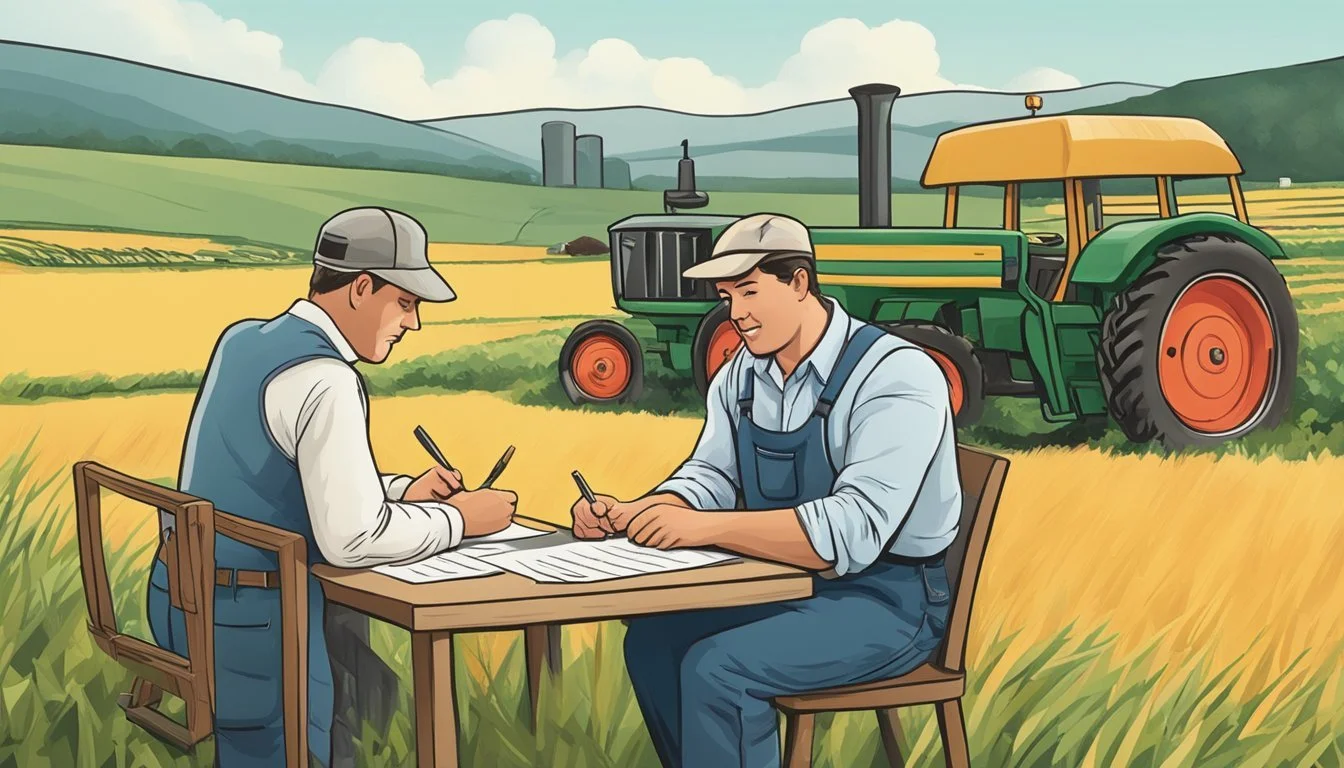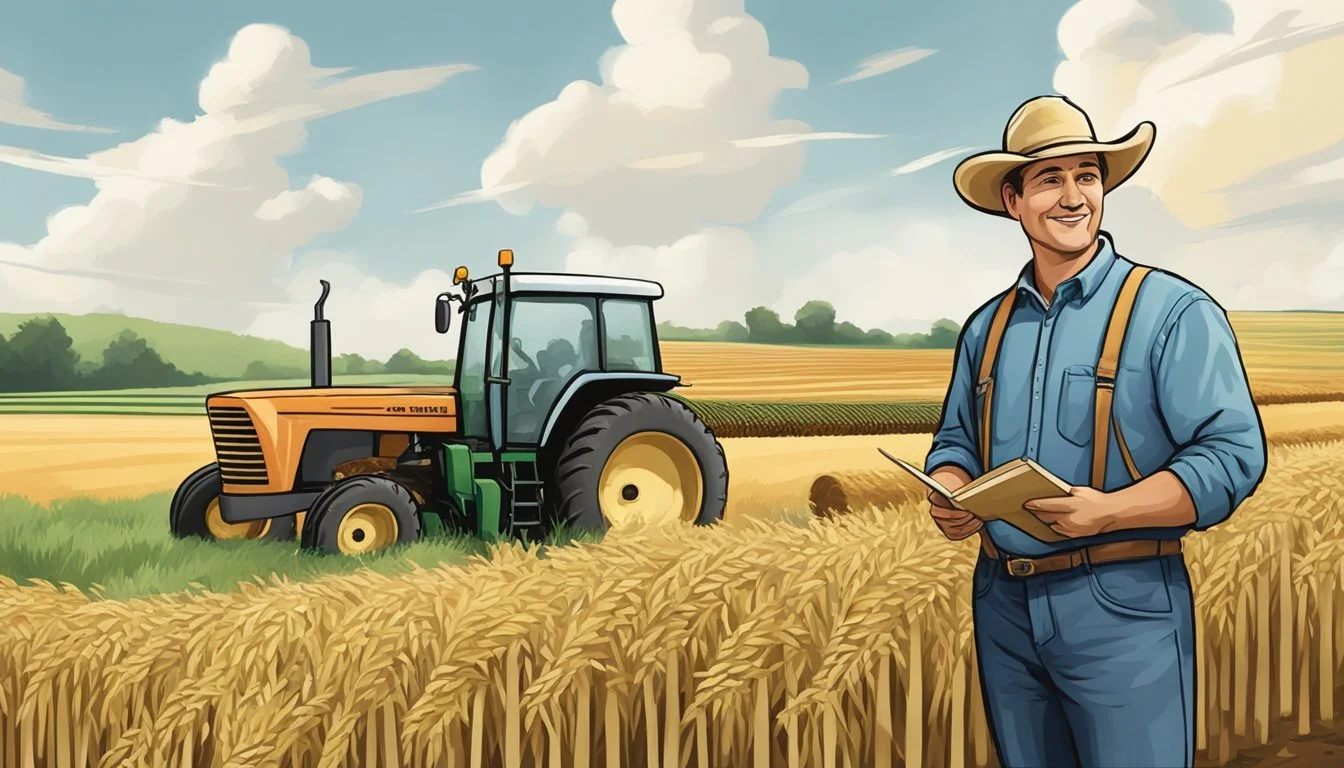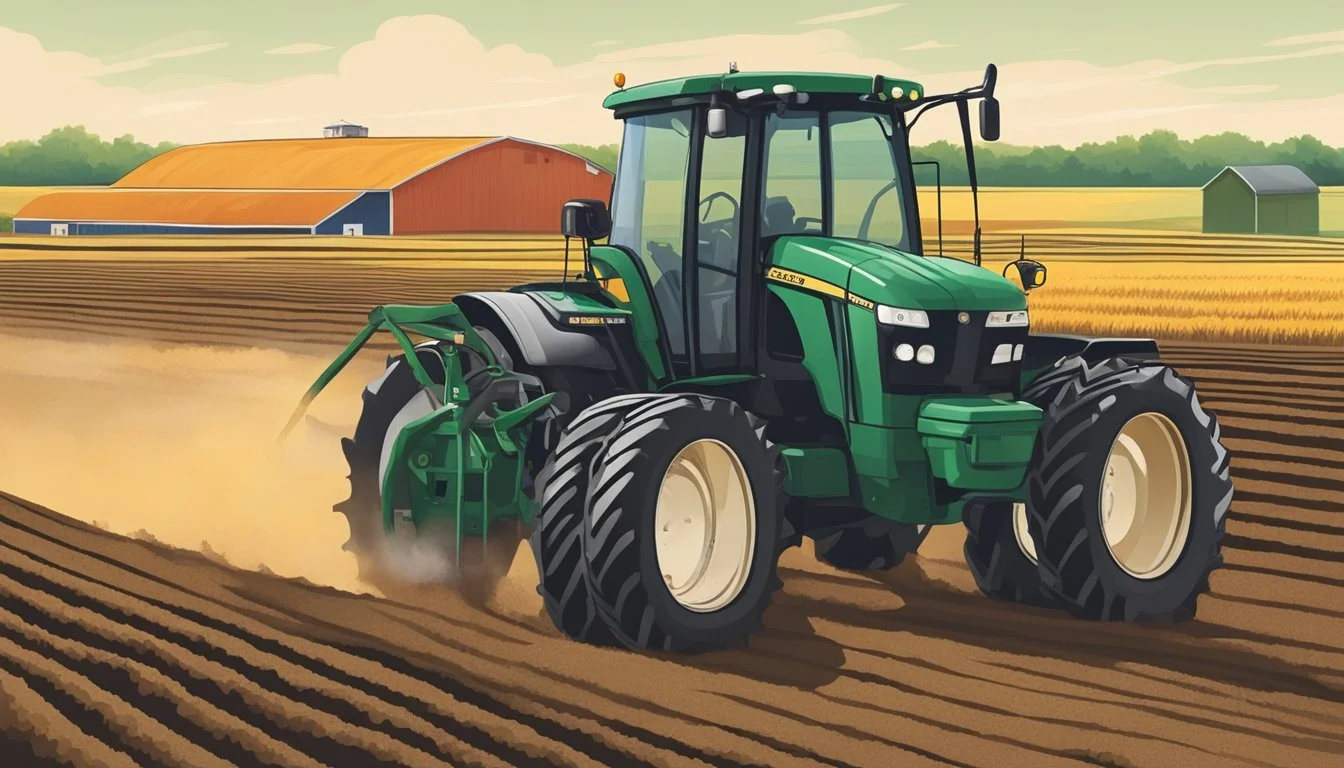Farm Loans in Illinois
Navigating Options and Opportunities
This Article is Part of Our Guide on Farm Loans for All 50 U.S. States
Illinois stands as a significant contributor to America's agricultural output, and farm loans play a pivotal role in the state's farming successes. Whether established farmers and agribusinesses seek to expand or newcomers aim to get their footing, a variety of loan options catering to different needs are available in Illinois. Lenders like Farm Credit Illinois specialize in offering loans with low upfront interest rates, flexible terms, and, notably, no lender fees at closing. These tailored loans aren't just financial tools; they are investments in the state's agricultural future, offering a way to put money back into the pockets of the farming community.
The landscape of farm loans in Illinois is made even more accessible through initiatives like the U.S. Department of Agriculture's (USDA) online application system for Direct Loan customers. This modern approach simplifies the application process, making it more convenient for Illinois farmers to access necessary funds. The USDA also provides specific programs aimed at helping beginning farmers and ranchers. Recognizing the barriers these newcomers face, the USDA introduces definitions and limits, such as restricting eligibility to those who have not operated a farm for more than 10 years and those who do not own a significantly larger than average farm.
These provisions ensure that Illinois offers a supportive environment for both the growth of established farms and the nurturing of new agricultural ventures. Farm Ownership Loans, a popular choice, facilitate the purchase or expansion of a farm or ranch, as well as improvement to infrastructure and conservation efforts. With loan offerings up to $600,000, these tools manifest the USDA's commitment to preserving and enhancing the state's robust agricultural industry while keeping the interests of the environment and the farm community at heart.
Understanding Farm Loans in Illinois
In Illinois, farm loans are a critical resource for farmers and ranchers seeking financial aid for various agricultural operations. This section will discuss the variety of available farm loans, crucial loan terms to be aware of, and the typical process involved in applying for agricultural financing in Illinois.
Types of Farm Loans
There are several types of farm loans available in Illinois that cater to different needs within the agricultural sector:
Farm Operating Loans: These loans provide farmers with the necessary capital to cover operating expenses such as purchasing livestock, equipment, feed, seed, and fertilizer.
Farm Ownership Loans: Aimed at assisting farmers in buying or expanding property, these loans typically offer more substantial amounts and longer repayment terms.
Guaranteed Loans: The government backs these loans, guaranteeing a portion of the loan and reducing risk for the lender.
Direct Loans: These are offered by the government directly to farmers, with microloans that cater to smaller financial needs and new or underserved farmers.
Farm Loan Programs: Spearheaded by the Farm Service Agency (FSA), these programs often involve loan assistance tools to help borrowers navigate their options.
Key Loan Terms
When considering a farm loan in Illinois, understanding the key terms is vital:
Interest Rates: The cost of borrowing money, which can be fixed or variable.
Loan Term: The duration over which the loan must be repaid.
Down Payment: The initial amount paid by the borrower, often a percentage of the purchase price.
Collateral: Assets pledged by the borrower to secure the loan.
Loan Application Processes
The loan application process for farm loans involves several steps, which may vary by lender and loan type:
Assessment of Financial Need: Borrowers must evaluate their financial requirements and purpose for the loan.
Loan Assistance Tools: Utilization of tools provided by agencies such as the FSA can aid in discerning the best loan option.
Compilation of Required Documents: Applicants must gather relevant financial statements, plans for the loan's use, and credit history.
Application Submission: The complete application is submitted, often including business plans and proof of experience in farming.
Throughout each of these stages, lenders will assess the viability and creditworthiness of the applicant, ensuring that the loan serves its intended purpose and aligns with the borrower's financial capacity.
Eligibility and Requirements
The availability of farm loans in Illinois is governed by specific eligibility criteria and loan requirements, designed to support family farmers, beginning and small farmers, and non-traditional farming operations. Ensuring these entities meet the defined prerequisites allows them to access necessary financial resources through various loan programs.
General Eligibility
To qualify for farm loans, applicants must meet certain general eligibility requirements:
Experience: Candidates should demonstrate experience in farming, ranching, or a related agricultural activity.
Ownership: For certain loans, an applicant should not own a farm exceeding 30 percent of the average county size.
Operation: The agricultural operation must primarily be within the United States and conducted for commercial purposes.
Size: Small and beginning farmers are often given preference, with specific programs tailored to their needs.
Credit History: They should possess an acceptable credit history, demonstrating the ability to repay the loan.
Specific Loan Requirements
Each farm loan program in Illinois may have additional specific requirements:
Farm Operating Loans: These loans necessitate a detailed business plan outlining the agricultural operation's goals and financials.
Requirement Details Eligible Enterprise Must be an agricultural operation, excluding non-farm pursuits. Use of Funds Can only be applied towards farm-related expenses.
Farm Ownership Loans: Designed for the purchase or expansion of a farm or ranch, these loans have their own stipulations.
Requirement Details Real Estate Funds are allocated for land purchase and improvement. Conservation Efforts Loans may include aspects covering soil and water conservation.
Youth Loans: These are tailored to individuals aged 10 to 20 years, allowing them to kickstart their agricultural projects, provided they have a project advisor.
Non-Traditional and Specialty Operations: Such enterprises might be eligible provided they contribute to the farm's overall operation and profitability.
Having clear and concise knowledge of these eligibility and loan specifics is crucial for applicants before they proceed with their application for farm loans in Illinois.
Loan Offerings by the Farm Service Agency
The USDA's Farm Service Agency (FSA) provides a range of loan programs designed to support farmers in Illinois. These loans include options for purchasing land, buying equipment, covering operating expenses, and responding to emergency circumstances.
Direct and Guaranteed Loans
The FSA offers Direct Loans which are funded and serviced by the agency itself, providing capital to farmers and ranchers who are unable to secure commercial credit. Within this category, there are:
Farm Ownership Loans for purchasing farmland, constructing and repairing buildings, and other related costs.
Operating Loans for costs associated with daily farm operations.
On the other hand, Guaranteed Loans are made by lending institutions and backed by the FSA. These loans allow the FSA to provide farmers and ranchers with access to credit through conventional lending channels with the FSA guaranteeing up to 95% of the loss of principal and interest.
Youth and Microloan Programs
Youth Loans are a subset of Direct Loans intended to support young individuals between the ages of 10 and 20 in conducting agricultural projects. The projects must be for educational purposes and are often tied to 4-H clubs or FFA.
The Microloan Program, which also falls under the Direct Loan umbrella, aims to assist smaller farming operations, catering to non-traditional and niche operations. Microloans can be either an Operating or Farm Ownership Loan and offer a maximum of $50,000 to eligible applicants, simplifying the application process for smaller loans.
Emergency Loans
FSA's Emergency Loans are available to help producers recover from production and physical losses due to drought, flooding, other natural disasters, or quarantine. These loans can be utilized for restoring or replacing essential property, paying all or part of production costs associated with the disaster year, paying essential family living expenses, reorganizing the farming operation, and refinance certain debts.
Farm Ownership Loans can be used to repair damage, and Operating Loans can cover production costs affected by the disaster.
Farmers in Illinois are encouraged to use the Farm Loan Discovery Tool provided by the FSA to determine their eligibility for these various loan programs.
Purchasing and Expanding Farmland
In Illinois, acquiring new farmland or expanding existing operations involves navigating real estate loans and down payment requirements. Landowners seeking to invest in their businesses have opportunities for tailored financing and programs designed to improve agricultural facilities.
Acquiring New Land
When land owners in Illinois consider purchasing additional farmland, they often turn to competitive farm real estate loans. Farm Credit Illinois specializes in providing rate and term options tailored to individual requirements, which can be pivotal for both expanding an existing farm or starting a new agricultural venture. For instance, the Federal Service Agency (FSA) 50-45-5 loan program assists beginning farmers:
Local lender: Finances 50% of the purchase.
FSA: Finances an additional 45%.
Borrower: Makes a 5% down payment.
This structured assistance aids in reducing the entry barrier for new farmers aiming to purchase land.
Making Farm Improvements
Improving farm facilities is a significant aspect of farm expansion. Land owners seeking to enhance their farmland, be it through constructing new buildings or improving existing structures, can access real estate loans designed for such advancements. Farm Credit Illinois once again features as a leading provider of financial support, backing a variety of farm improvement projects, which can enable land owners to bolster the value and productivity of their farmland. It's important for borrowers to evaluate how the loan terms, interest rates, and repayment plans align with their long-term business objectives and financial health.
Financial Considerations for Illinois Farmers
Managing the financial aspects of farming in Illinois requires a strategic approach to interest rates and repayment terms, along with careful handling of farm operating costs. Farmers must balance these elements to maintain financial stability in an environment of fluctuating market conditions and operating expenses.
Interest Rates and Repayment Terms
Loan interest rates for farms can vary, and they are influenced by market trends and the type of lender. Commercial banks and Farm Credit System lenders typically offer different median rates, with the latter often presenting lower interest rates for both short-term and long-term non-real estate loans. The choice of lender and the structure of the loan agreement can have significant implications for a farmer's payment schedule and financial risk.
Farmers must consider the term and payment schedule of loans, aiming to match them with their seasonal cash flow. A too aggressive repayment plan can strain finances during off-peak seasons, whereas a well-structured loan can provide better cash flow management, catering to the cyclical nature of farm income.
Managing Farm Operating Costs
Effective control of farm operating costs is crucial for Illinois farmers, especially in light of predicted lower incomes for the coming years. Operating costs encompass inputs like seed and fertilizer, machinery maintenance and fuel, labor, and family living expenses.
Inputs: The cost of inputs should be monitored closely, using budget-friendly options without compromising on quality.
Machinery: Regular maintenance can preempt expensive breakdowns and optimize fuel efficiency.
Labor: Efficient labor management ensures productivity while keeping costs under control.
Family Living Expenses: Keeping personal expenditures separate and budgeted avoids financial strain on the farm's operations.
Illinois farmers lease a significant proportion of land, further emphasizing the importance of effective expense management to balance out rental obligations and maintain profitability.
By attentively negotiating loan terms and rigorously managing operating expenses, farmers can mitigate financial risk and sustain the longevity of their agricultural operations amidst economic fluctuations.
Agricultural Practices and Market Engagement
Farmers and ranchers in Illinois engage in a diverse agriculture economy, which includes traditional crops like beans and wheat, as well as livestock and agribusinesses. Effective risk management strategies and active participation in markets are crucial for the sustainability and growth of these operations.
Crop Insurance and Risk Management
Crop insurance serves as a cornerstone for managing the uncertainties inherent in farming. Illinois farmers can safeguard their operations against unpredictable weather and crop failures by investing in crop insurance policies. This is especially pertinent for commodities such as beans and wheat, where unexpected climate conditions can drastically affect yield.
Beans: Farmers use specific insurance products tailored to cover yield and price risks.
Wheat: Both yield protection and revenue protection policies are common, with adjustments for market fluctuations.
Farmers and ranchers also implement various risk mitigation strategies, such as:
Rotating crops to improve soil health and reduce pest pressures.
Diversifying crop types to spread financial risk.
Adopting conservation practices to preserve land and water resources.
Market Participation and Commodities
Active market participation is key for Illinois farmers to ensure profitability and business viability. They trade commodities, balancing between immediate cash flow needs and long-term financial strategies.
Spot Market: Illinois farmers might sell commodities like beans and wheat directly after harvest for immediate cash.
Futures and Options Markets: Producers and agribusinesses engage in futures contracts to hedge against price volatility, securing a predefined price for their crops.
Livestock markets also represent a significant component of the state's agricultural sector. Ranchers often engage in futures markets to hedge prices for beef and pork, crucial for maintaining the economic stability of their operations.
Farmers are increasingly involved in agribusiness ventures, leveraging their expertise to expand into value-added products and innovative farming practices. They contribute to a dynamic market where Illinois' agricultural output meets both national and global demands.
Farm Credit Services in Illinois
Farm Credit Illinois emerges as a pivotal establishment in providing a suite of financial provisions tailored for the agricultural community in Illinois, including farm loans and cash patronage.
Farm Credit Illinois Services
Farm Credit Illinois is dedicated to serving the financial needs of rural communities and agricultural sectors in the southern 60 counties of Illinois. They offer a variety of services and products, including:
Farm Loans: Competitive financing solutions for farmers and agribusinesses.
Real Estate Loans: To finance land purchases, refinancings, and improvements.
Production Loans: For operational expenses, livestock, and equipment.
Insurance Services: Crop and livestock insurance to manage agricultural risks.
Appraisals: Professional evaluations of farm properties and assets.
Cash Management Accounts: Interest-bearing accounts to manage farm funds effectively.
Customer Service: Farm Credit Illinois prides itself on exceptional customer service with on-farm service and a farmer-owned cooperative approach.
Technology: A secure online portal and mobile app enhance access to services.
The cooperative also places a strong emphasis on agricultural expertise, ensuring that their staff is well-versed in the intricacies of farming and agribusiness.
Understanding Cash Patronage
Cash Patronage refers to the dividends returned to the members of Farm Credit Illinois. These dividends reflect the cooperative's financial health and operational success. Here are the specifics:
Patronage Dividends: As a cooperative, Farm Credit Illinois distributes a portion of its earnings back to its members based on the volume of business each member conducts with the organization.
Financial Benefits: The cooperative advantage means that members see reductions in their effective interest rates through the distribution of patronage dividends.
Farm Credit Illinois reported distributing $151.6 million in patronage dividends as of December 31, 2022, showcasing their commitment to sharing success with their members. This reinforces their role as a stalwart supporter of Illinois agriculture, today and into the future.
Support for Specialized Farm Operations
In Illinois, specialized farm operations that engage in non-traditional agriculture or focus on specialty crops and livestock have access to tailored programs and financial support aimed at fostering growth and innovation in these niche sectors.
Non-Traditional Agriculture
Non-traditional agriculture encompasses a wide array of practices that diverge from conventional farming methods. Entities engaged in these practices often require distinct types of support to help them thrive. In response, various programs and incentives have been designed specifically for these non-traditional operations.
Equity Agriculture Programs: Aimed at socially disadvantaged farmers, these programs provide financial assistance and loan opportunities such as the 'Socially Disadvantaged Farmer Down Payment Program'. It requires a minimum cash down payment of 5 percent and is designed to assist in purchasing a farm.
Online Loan Applications: To streamline the process, the USDA has initiated online applications for direct loan customers, offering easier access to financial support for non-traditional farmers.
Specialty Crop and Livestock Operations
Specialty crop and livestock operations in Illinois can benefit from a range of programs focusing on unique and high-value agricultural ventures.
Grant Programs: Initiatives like the Dairy Business Innovation Alliance (DBIA) grant program foster development by offering financial grants to dairy farms for innovative projects.
Loan Assistance Tools: The USDA has developed tools to enhance customer service and equity among farmers, simplifying loan applications, thus facilitating financial support for specialty crop and livestock farmers.
These programs underscore the commitment to diversifying and strengthening the agricultural sector in Illinois by supporting specialty operations and non-traditional agriculture, reflecting a confidence in the growth and sustainability of such enterprises.
Youth and Educational Support
In Illinois, initiatives aimed at empowering the next generation of farmers through special loan programs and educational resources are prominent. These efforts focus on providing financial support and learning opportunities for young individuals interested in agriculture.
Youth Loan Programs
Farm Credit Illinois and the USDA Farm Service Agency offer loan programs designed specifically for young and beginning farmers. The FreshRoots Lending Program provides lending assistance with features tailored to their needs. Similarly, the USDA's Youth Loans are directed at individuals between the ages of 10 and 20, helping them with educational agricultural projects tied to organizations like 4-H clubs and FFA. These loans can be used for a variety of purposes, from purchasing livestock to financing other project-related expenses.
Program Age Range Purpose Affiliated Organizations FreshRoots - Lending assistance for various agricultural needs - USDA Youth Loans 10-20 Educational agricultural projects 4-H clubs, FFA
Educational Resources for Young Farmers
Young farmers in Illinois have access to a wealth of educational resources aimed at enhancing their skills and knowledge. Programs like 4-H and FFA provide a robust framework for agricultural education, fostering an environment where young farmers can learn about the industry, leadership, and community service. The state-supported Illinois Young Farmer (Farm Purchase) Guarantee Program complements these educational experiences with financial resources for purchasing capital assets critical for farming.
Navigating Disaster and Emergency Support
In the wake of natural disasters, Illinois farmers have access to various support mechanisms to aid their recovery efforts. It's crucial they act promptly to utilize available emergency loan assistance and technical guidance.
Responding to Natural Disasters
When natural disasters strike, such as severe droughts or tornadoes, the immediate step for Illinois farmers is to assess the impact and seek federal assistance. The USDA has designated certain counties as primary natural disaster areas, enabling the deployment of aid to affected producers. Farmers should be prepared to contact their crop insurance agents and report losses as soon as possible.
Key Actions:
Contact local USDA Farm Service Agency (FSA) offices
Report damages to crop insurance agents
Document impact thoroughly
Emergency Loan Assistance
Emergency loan assistance becomes available when the USDA issues a Secretarial natural disaster designation. These loans help farmers recover from production and physical losses. To navigate the emergency loan process, producers should:
Identify eligibility: Determine if their county is a designated disaster area.
Gather documentation: Compile necessary financial and production records.
Apply for loans: Submit applications through the FSA before deadlines.
Loan Details:
Interest Rate: Varies based on the program and the borrower's qualifications.
Repayment Terms: Tailored to the producer's situation subject to USDA guidelines.
Farmers also have the option to reach out to the USDA for technical assistance in their recovery. Tools like the Disaster Assistance Discovery Tool and Farm Loan Discovery Tool on farmers.gov can help pinpoint appropriate programs.
Advocacy and Guidance for Farm Families
In Illinois, farm families receive robust support through various federal programs and local expertise. These resources are particularly crucial for family farmers and producers seeking financial guidance and loan assistance.
USDA and FSA Support Networks
The U.S. Department of Agriculture (USDA), alongside the Farm Service Agency (FSA), offers a strong network of support for farm families. They administer programs that assist with credit availability, ensuring that family farmers have access to necessary funds for operations and asset purchases. Specific initiatives include:
Direct and Counter-Cyclical Program (DCP)
Price Support Loans
Loan Deficiency Payments (LDP)
These programs provide financial vehicles to help manage the risks associated with farming and promote soil and water conservation.
Loan Officer and Service Center Resources
Farm families can seek individualized assistance from loan officers located at USDA Service Centers. These officers provide:
Guidance on appropriate loan programs for capital asset purchase, including land and machinery.
Consultation on conservation projects and operating expenses.
The Illinois Farm Bureau also offers specialized grant opportunities, aligning with both USDA policy and local government priorities to aid rural development. These combined efforts from the USDA, FSA, and local entities play a pivotal role in supporting farm families and ensuring the vitality of Illinois's agricultural community.
Streamlining Farm Operations through Financing
Farmers in Illinois can enhance efficiency and promote growth through targeted financial solutions for essential agricultural needs. Financing provides vital resources for acquiring equipment and infrastructure, as well as managing cash flow through credit options.
Equipment and Infrastructure Financing
When it comes to equipment and infrastructure, farmers have access to loans designed for the purchase, repair, or upgrade of machinery and farm buildings. This financial support is crucial for ensuring that farmers can continue to operate at the highest levels of productivity with modern facilities and state-of-the-art technology. Specific loan programs may assist with the costs associated with:
Tractors, combines, and harvesters: Vital for planting and harvesting crops.
Irrigation systems: Essential for water management and crop yields.
Storage facilities: For safekeeping of grains and other produce.
Renovation of existing buildings: To improve efficiency and safety standards.
Revolving Credit and Refinancing Options
Farmers may seek revolving credit to sustain cash flow during off-peak seasons or to address unexpected expenses. A revolving credit line provides a flexible financing solution that allows farmers to borrow, repay, and reborrow funds as required, thus maintaining liquidity. It's an invaluable tool for covering ongoing operational costs, like:
Seed and fertilizer purchases.
Fuel for farm vehicles.
On the other hand, refinancing existing loans may provide farmers with lower interest rates or better terms, potentially reducing the overall cost of borrowing. Refinancing can offer immediate financial relief by:
Consolidating multiple loans into a single payment.
Extending the repayment term to lower monthly payments.
By utilizing these financial instruments, Illinois farmers can streamline their operations, ensuring they're well-equipped and financially stable to meet the challenges of modern agriculture.
Long-Term Strategic Planning for Farms
Effective long-term strategic planning is essential for the sustainability and growth of Illinois farms. Farmers must articulate a clear mission and vision for their operation, focusing on the conservation of vital resources such as soil and water.
Creating a Vision for Farm Growth
The creation of a vision for farm growth involves setting specific, achievable targets for the future. A farmer should:
Define specific growth milestones related to crop yield, livestock production, or acreage expansion.
Emphasize the need to conserve resources while scaling operations sustainably.
Sustainable Agricultural Practices
Implementing sustainable agricultural practices is key to the long-term success of farming operations. Farmers should:
Develop strategies to protect soil health, such as crop rotation, reduced tillage, or cover cropping.
Plan to conserve water resources by utilizing efficient irrigation systems and managing water usage effectively.










